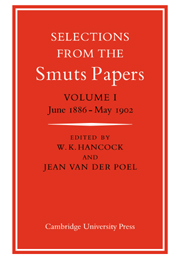1 - Stellenbosch
Published online by Cambridge University Press: 03 February 2010
Summary
The Smuts Collection contains only two letters, both written by Smuts, which relate to the five years (July 1886 to 1891) that he spent in Stellenbosch as a student at Victoria College. There are, however, a few other personal documents of this period that compensate, to some extent, for the paucity of letters and give an insight into the mind of their author. These are note-books, essays and verses. Some of the note-books are filled with Greek vocabularies—evidence of the thoroughness and intensiveness of Smuts's methods of study. The most ambitious verses are birthday poems for Isie Krige written under the spell of Shelley. The ablest essays are Homo Sum—on the subject of slavery—which was published in Het Zuid-Afrikaansche Tijdschrift for June 1889, and South African Customs Union, entered for a university competition in 1891.
This subject had been prescribed. It was topical, for South African politics at that time turned largely upon the conflicting customs and railway interests and policies of the two inland Boer republics and the two maritime British colonies. Smuts clearly found it congenial. He wrote at length, no doubt at too great length, but with sincerity and force. He built his whole essay upon the conviction which was also to be the foundation of his statesmanship—‘the fact that South Africa is one.’ The excerpt below (4) sums up the arguments for unity and shows a mature and detailed grasp of the actual political situation in 1891.
- Type
- Chapter
- Information
- Selections from the Smuts Papers , pp. 3 - 22Publisher: Cambridge University PressPrint publication year: 1966

